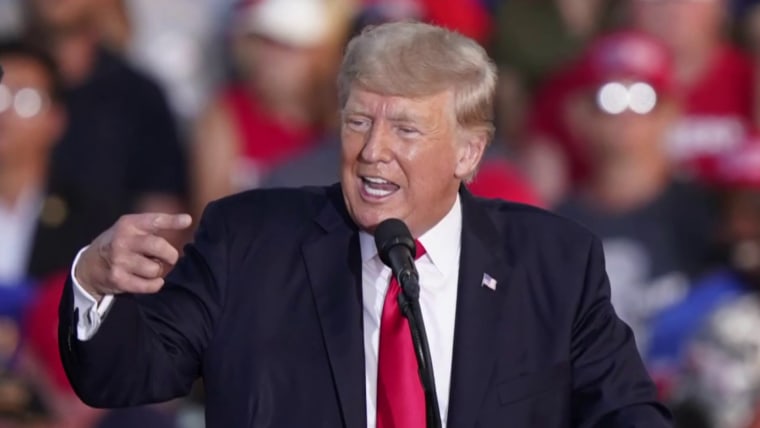WASHINGTON — There are probably more effective ways for former President Donald Trump to unlock his social media accounts than suing Twitter, Facebook and Google for sanctioning him.
He could, for instance, denounce the rioters who stormed the Capitol in his name Jan. 6, publicly accept the legitimacy of his defeat last November and promise not to use his accounts in ways that violate the platforms’ standards. That might persuade the platforms to let him back in.
But that wouldn’t have the same headline-grabbing, money-raising, base-thrilling appeal of federal lawsuits that position Trump as the aggrieved victim of a vast network of government agents, news media outlets and social media companies. Nor would that allow him to cast himself as the champion for a class of such victims or add more federal judges to his enemies list when he inevitably loses his cases.
Trump already has banked the headlines and he’s collecting cash. The only risk to him — the perils of discovery and under-oath deposition — is limited by the likelihood that the court will dismiss his suits nearly as quickly as they materialized Wednesday.
So it’s reasonable to conclude that he’s using the courts, as he has often done in the past, to gain advantage outside of them.
After all, Trump’s contentions and demands would turn the First Amendment on its head. He says the social media giants and their CEOs have violated his constitutional right to free speech. For that to be true, the courts would have to conclude that tech companies are arms of the government, which is singled out in the First Amendment.
“I have not seen that argument get past the straight-face test,” said Vanderbilt University law professor Brian Fitzpatrick, who predicted defense lawyers would win motions to dismiss.
As recently as 2019, Supreme Court Justice Brett Kavanaugh wrote in a majority opinion that “the Free Speech Clause of the First Amendment constrains governmental actors and protects private actors,” adding that “a private entity may be considered a state actor when it exercises a function ‘traditionally exclusively reserved to the State.'”
In Trump’s suit against Facebook, he calls the company a “state actor.”
But the decision to publish material — or to refrain from publishing it — is not a function traditionally, exclusively or otherwise reserved to government in the United States. That’s the whole point of the free expression clauses of the First Amendment. What Trump actually wants is a 180-degree twist on the concept of free speech: He wants the federal judiciary to compel private companies to publish his speech, and those of his followers, for free and without limitation.
When Trump was banned from Twitter in January, he was the sitting president of the United States, the most powerful of all state actors in the world. If the court sides with Trump, it will conclude that the president can force publishers to print his content.
In an ironic twist, Trump claims that lawmakers and former first lady Michelle Obama coerced Facebook to take him off the platform through public pressure and by threatening to repeal the very section of law that Trump is now seeking to overturn. He makes that assertion in a lawsuit that, in and of itself, could be seen as coercive.
But if Trump isn’t likely to win his cases, as many legal experts were quick to point out, that doesn’t mean he gains nothing from escalating his fight with the social media companies. While his legal action wasn’t the lead story for news outlets Wednesday, it was prominently placed on many of their web sites.
And, of course, there’s the money.
“Pres Trump: I am SUING Facebook and Twitter for UNCONSTITUTIONAL CENSORSHIP,” Team Trump wrote in a text message that quickly circulated on — you guessed it — Twitter. “For a short time, 5X-IMPACT on all gifts! Donate NOW.”
There is one potential pitfall to Trump’s approach. If a court decides to let him move forward with one or more of the lawsuits, he would open himself to having to testify on matters related to his suspension from the platforms — including, presumably, the early January tweets that led Twitter to suspend his account “due to the risk of further incitement of violence.” Given his history, he might very well drop the lawsuit before it gets to that point, as he has done in the past.
But if all he wants is money and attention, he’ll get some of both and won’t have to face a deposition. The only victims are people who have been led to believe the Constitution requires social media companies to publish their posts.
Source: | This article originally belongs to Nbcnews.com











